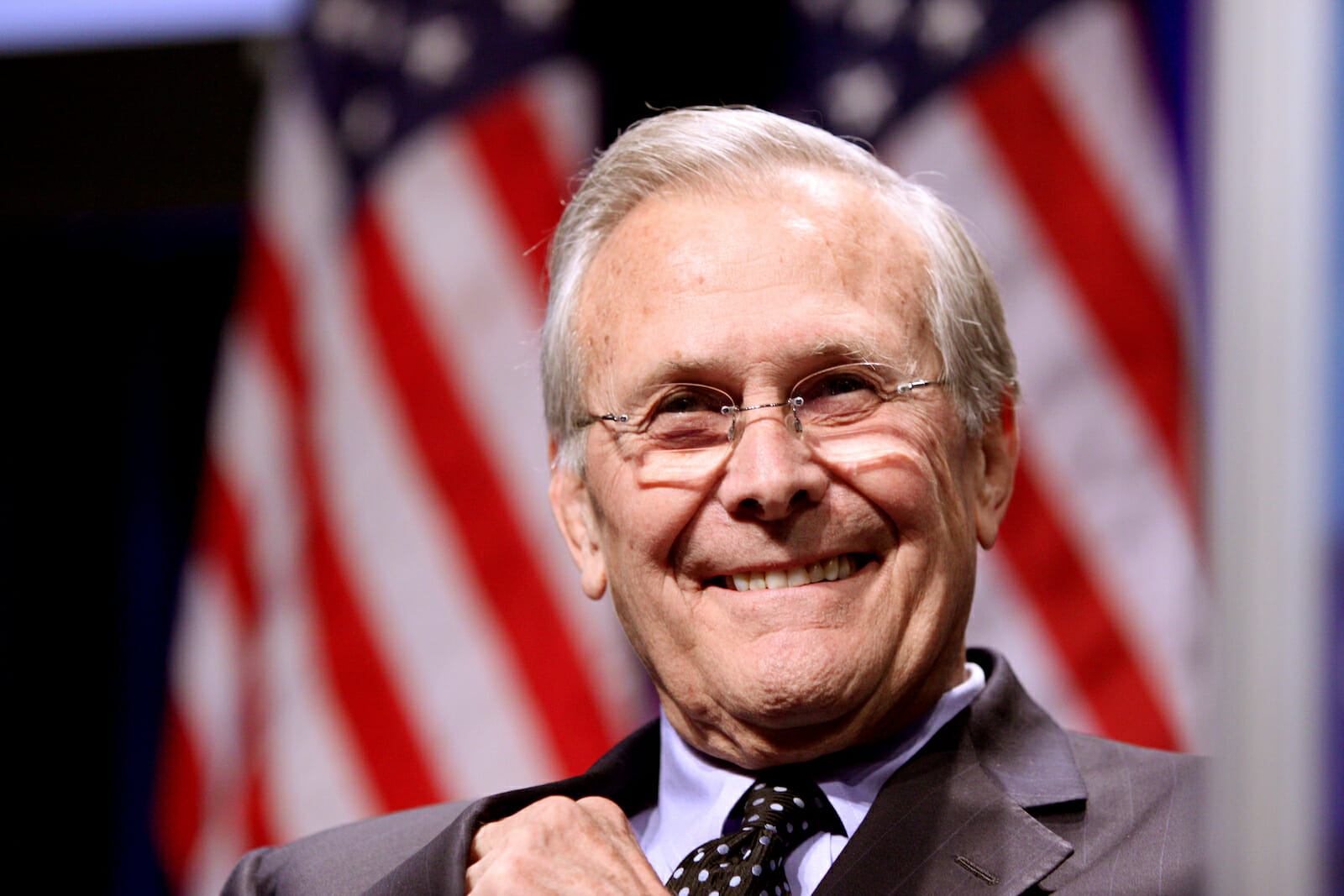
Revisiting the Iraq War
Neoliberalism has become the dominant strand of economics since the failings of Keynesianism were presented in the early 1970s. Neoliberalism is influenced by the free market ideology of Milton Friedman and has been expanded globally by Western states, namely the United States.
Neoliberal economics stemmed from Milton Friedman and his critique of Keynesian economics. Friedman predicted an underlying problem of Keynesianism, the issue of inflation. Since the ‘New Deal’ Friedman has argued against government action to eliminate unemployment. Friedman claims that government attempts to eliminate unemployment are ultimately futile; this is because the government will be perpetually relinquishing money to maintain high employment. A state pursuing free market economics, in theory, should, therefore, favour individual property rights, the rule of law, free markets and free trade. According to Friedman, the individual is held responsible for his or her own well-being, as opposed to looking to the state for support. Individual success or failure is therefore attributed to entrepreneurial virtues or personal failings.
The pursuit of neoliberalism in US policy originated in the Reagan administration. The fundamental notion was that markets corrected themselves, allocated resources efficiently and served the public interest well. It was this notion of self-regulation that underlay Thatcherism, Reaganomics, and the ‘Washington Consensus.’ The Washington Consensus presented ten reforms that would enable economic growth in a neoliberal state. The reforms emphasized the reduction of deficits, privatization of the public sector, the reduction of taxes and the encouragement of international trade. It was these ten principles, which helped guide US foreign policy and aid during the 1990s. Through institutions like the International Monetary Fund and World Bank, the US government began to withdraw funds and support for statist regimes.
Through enforcing individual property rights and reducing state influence, it was assumed by the Reagan administration, that the ‘Third World’ would be able to achieve economic prosperity. Therefore the US promoted capital friendly ‘shock therapies’ that were aimed at transferring assets from the public sector to the private sector.
Neoliberalism is widely considered to have failed in terms of its announced goals. Neoliberal policies have not established rapid economic growth, reduced poverty or stabilized economies. To the contrary, poverty is rising in many developing countries because of debt repayments to foreign financiers. The neoliberal policies imposed upon developing countries have generally widened the gap between the rich and poor, focusing wealth into the hands of local elites. Although there have been some neoliberal success stories, neoliberalism should not be used as a universal tool for economic prosperity.
Different states require different solutions based upon their context. However, it is the selective nature of neoliberalism that undermines its validity as an economic model. The free market is only pursued providing it serves the interests of elites. The selectivity of neoliberalism in its application of the free market is to be expected, the underlying weakness of the free market is that it relies upon an unrealistic assumption of society.
The challenges facing neoliberalism were apparent during the US invasion of Iraq in 2003. A common criticism of the 2003 invasion of Iraq was that George W. Bush did not have a post-war plan. Author Naomi Klein counters this accusation asserting that the Bush administration did in fact have a post-war plan, to turn Iraq into a neoliberal utopia. The neocons in the Bush administration (Dick Cheney, Donald Rumsfeld, Paul Wolfowitz and Douglas Feith) considered the invasion to be an opportunity for Iraq to be reborn into a neoliberal capitalist state.
The Coalition Provisional Authority (CPA), headed by Paul Bremer, advanced the neoliberal agenda in Iraq. Bremer wasted no time in pursuing a neoliberal agenda in Iraq. Within his first month, Bremer ordered the privatisation of 200 Iraqi state-owned companies. Bremer’s neoliberal policies were further demonstrated in September 2003 with Orders 37, 39 and 40 which reduced corporate tax from 45 percent to 15 percent. Foreign firms were also able to retain 100 percent of their Iraqi assets, and take 100 percent of the profits out of Iraq, while Order 40 refined the Iraqi banking system. These neoliberal reforms led to The Economist calling Iraq a “Capitalist Dream.” The consequence of these reforms was the redundancy of 500,000 workers, and the neglect of the majority of Iraqi businessmen.
Enforcing such radical and drastic reforms can cause disdain, and eventually revolt, amongst citizens. The Bush administration acknowledged that the Iraqis would have to endure short-term hardships, like job losses, for Iraq to prosper economically in the long term. To circumvent this challenge the CPA and Bremer relied upon the shock doctrine. The shock doctrine utilized the invasion and bombardment of Iraq to distract the Iraqi people from the privatization and reforms. It was assumed that, rather than protesting and rebelling against the reforms, the Iraqis would be forced to focus upon their own survival. The Bush administration, however, failed to anticipate the complexities of restructuring Iraq. Rather than shocking Iraqis, the invasion and bombardment jolted many of the 500,000 laid-off workers into resistance fighting. Likewise, excluded Iraqi businessmen revolted by funding the insurgency to deter foreign investment.
The neoliberal approach to Iraq overlooked the discontent Iraqis felt over losing their jobs and witnessing their industries sold off to Western corporations. Questions were also raised by US military commanders over the vast job losses, which caused an increase in the insurgency force. Through Orders 37, 39 and 40 the CPA had hoped to attract foreign investment into Iraq. However, the frequent and destructive attacks from Iraqi insurgents proved a major deterrent to investors and corporations. The burning and hanging of four US mercenary soldiers sent a strong message to any would-be investors or corporations. Despite the favourable terms offered to corporations, within a week of the four hangings, 1500 contractors were evacuated from Iraq. No matter how favourable the neoliberal orders from Bremer were, investment in a war-torn society was unlikely for some time. This meant that the short-term outsourcing of services, and lack of jobs, was even more devastating for the Iraqi people.
The invasion of Iraq demonstrated some of the fundamental failings of neoliberalism. The CPA was trusted to direct and govern Iraq. However, it consisted of the very people that did not believe in government influence or the public sector. The free market should be open to competition. However, the CPA in Iraq went strictly against this notion. As opposed to encouraging and developing local business, the CPA outsourced reconstruction services primarily to US corporations. This meant that the economic growth of the nation was almost entirely reliant upon foreign investment. The very neoliberal policies that were designed to attract investment, in fact caused revolt and violence.
The US invasion of Iraq demonstrates the complexities of applying a free market to any society. Despite the determination of the neoliberals since the 1970s, the majority of the world has failed to prosper economically.
Blame has been pointed at states for not embracing neoliberalism enough, while orthodox neoliberals have argued against the interference of financial institutions. Ultimately neoliberalism and the application of the free market is destined to fail, this is because the free market cannot be applied in reality. The success of neoliberalism is based almost completely upon the long-term benefits over the short term. However, it is unclear how long exactly it will take for neoliberalism to benefit the whole of society. It is for this reason that the majority of citizens will be against neoliberal reform. Iraq, although an extreme case, demonstrates some of the consequences of revolt in a neoliberal society.

